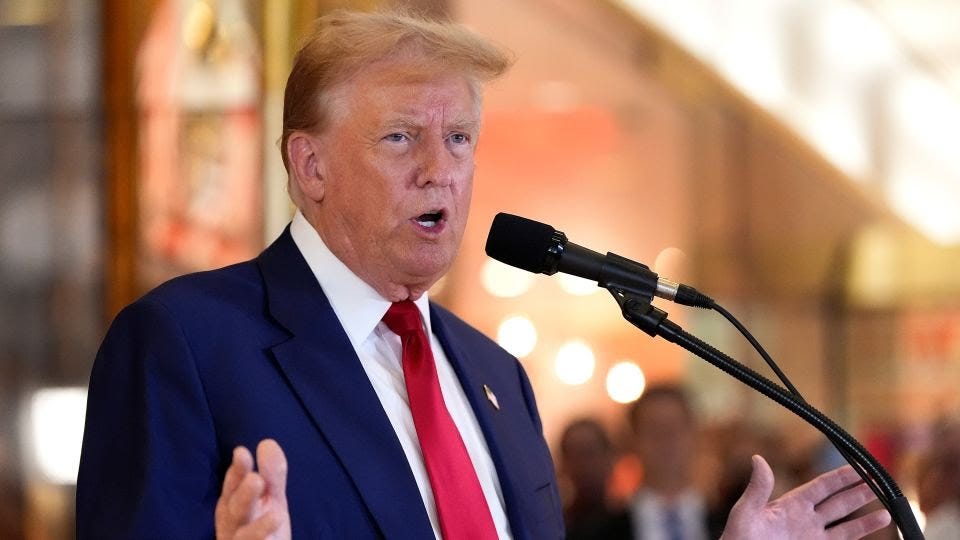Trump Warns EU: Boost U.S. Energy Imports or Face Steep Tariffs
A Closer Look at Trump's Call for Trade Reform and Its Broader Implications

In a fiery announcement, President-elect Donald Trump has put the European Union (EU) on notice: increase imports of American oil and gas or prepare for a wave of tariffs targeting European exports. This ultimatum reflects Trump's broader campaign to tackle trade imbalances and secure stronger economic ties favoring U.S. interests.
"I told the European Union that they must make up their tremendous deficit with the United States by the large-scale purchase of our oil and gas. Otherwise, it is TARIFFS all the way!!!" Trump declared, amplifying his administration's intent to rebalance trade dynamics between the two economic powerhouses.
This bold statement immediately reverberated across global markets, reigniting fears of a looming trade war while exposing the complex economic and geopolitical ties between the U.S. and the EU.
Breaking Down the Trade Deficit
The trade imbalance between the United States and the EU has been a point of contention for years. In 2022, the EU exported over $700 billion worth of goods to the U.S., while American exports to the bloc amounted to roughly $590 billion, leaving a trade deficit exceeding $130 billion. Trump's administration views this gap as an economic and strategic vulnerability, particularly when it comes to energy resources.
By demanding greater purchases of U.S. oil and liquefied natural gas (LNG), Trump aims to achieve two objectives: reduce the trade deficit and strengthen America's position as a global energy leader.
However, the EU's energy needs, while significant, are influenced by a range of factors, including market dynamics, geopolitical considerations, and its commitment to transitioning toward renewable energy sources.
Europe’s Energy Challenges
Europe’s energy landscape is undergoing significant transformation. Following the invasion of Ukraine by Russia in 2022, the EU began diversifying its energy sources, reducing reliance on Russian gas and increasing imports from alternative suppliers, including the United States.
U.S. LNG exports to the EU have surged in recent years, but the bloc still faces mounting energy pressures. Recent reports show that EU gas reserves are depleting rapidly, driven by colder-than-expected winters, heightened competition for LNG from Asian markets, and a reduction in seaborne imports.
As of December 2024, the EU's gas storage levels have fallen to 75%, a stark drop from last year's 90%. While still above the ten-year average, these figures raise concerns about the bloc's ability to meet demand during prolonged cold spells.
In this context, Trump's ultimatum has placed additional pressure on EU policymakers to secure their energy future while navigating the trade relationship with the United States.
Navigating Complex Trade Relations
Trump’s demands present a dilemma for the EU. Agreeing to purchase more U.S. oil and gas may ease immediate tensions and stave off tariffs. However, such a move could undermine the bloc’s climate goals, which prioritize reducing fossil fuel dependence and investing in renewable energy.
Moreover, the EU operates as a collective of 27 member states, each with distinct energy policies and economic priorities. This fragmented structure complicates efforts to respond cohesively to external pressures like those from the United States.
European leaders have voiced concerns about the potential consequences of escalating trade tensions. Tariffs on EU exports—particularly in critical sectors like automobiles and luxury goods—could have significant economic repercussions, including job losses and weakened industrial output.
The Broader Implications
For the United States, the potential imposition of tariffs might yield short-term economic benefits by encouraging domestic consumption and bolstering energy exports. However, such actions also risk sparking retaliatory measures from the EU, which could disrupt global trade and create uncertainty for businesses on both sides of the Atlantic.
At the same time, the Trump administration's strategy underscores its commitment to redefining America's role in international trade. By leveraging the U.S.’s abundant energy resources, Trump seeks to position the country as a dominant player in the global energy market while addressing domestic economic concerns.
What Lies Ahead?
As Trump's inauguration approaches, the EU faces a critical decision. Will it acquiesce to Trump's demands and increase energy imports, or will it push back and risk a trade confrontation? The answer may depend on the bloc's ability to balance immediate economic pressures with its long-term strategic goals.
In the meantime, this unfolding drama highlights the intricate interplay between trade policies, energy security, and geopolitics. Both sides must tread carefully to avoid a broader economic fallout while preserving their respective interests in an increasingly interconnected world.





